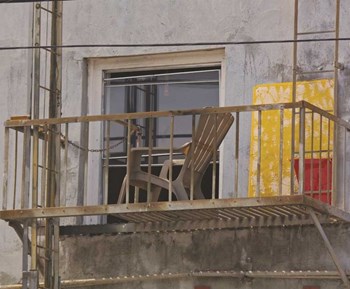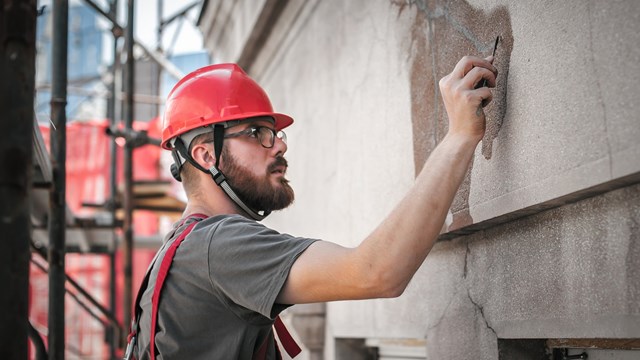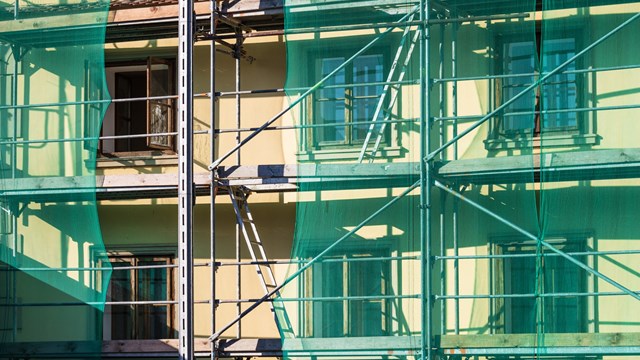
Despite the due diligence of boards and property managers, building code violations can occur during routine inspections—be it a faulty pipe, broken step or rusted fire escape. It is the speed and accuracy of addressing these infractions which is critical, although frequent problems are often overlooked, leading to costly headaches.
Common Offenders
“One of the most common building code violations that I see relates to porches,” says Chicago-based attorney Bradford Miller. “Ever since the deadly porch collapse that occurred a few years ago, the city of Chicago has been cracking down on unsafe porches. Other common violations include improper signage—or no signage at all—for management company and owner information, no permits on file for work done, and safety issues related to fire escapes.”
All boards and property managers must adhere to rules and regulations clearly spelled out in the Chicago Building Code, explains Department of Buildings’ spokesperson Susan Bisno Massel. “Department of Building inspectors determine or write up violations. In the case of most condominiums and co-ops, it would likely be one of the department’s Conservation Inspectors who inspect existing buildings versus new construction,” she says. “The vast majority of the complaints investigated are received from city residents who phone them into 311.”
The list of most cited condominium and co-op violations also includes masonry repairs, wall repairs, obstruction to entry and exit ways, working without a permit and failure to comply with the AIG elevator inspection program for properties located in the central business district. “If the city deems a condition hazardous, it will file its case in the Circuit Court as opposed to at an administrative hearing,” says Attorney Michael Shifrin with the Buffalo Grove-based law firm of Kovitz Shifrin Nesbit. “The city also takes violations of the fire code very seriously, such as malfunctioning smoke detectors and exit signs,” he adds. “These fines can be very high.”
The purpose of building code violations, and their enforcement, is not merely to maintain a building in proper working order, but to mitigate risk. “A board may incur liability for failing to remedy a code violation in the event that a person is injured by a condition that is the subject of the code violation,” says Attorney Mark Roth with the firm Orum & Roth. “Take for instance a situation where a building is cited for loose or crumbling masonry. The board ignores the citation or takes no action to correct the condition. A pedestrian is struck by a falling brick,” he continues. “The injured party’s attorney may bring a cause of action against the Board for willful conduct in failing to repair the property in a timely manner.”
Who is Watching Who
Since most boards and managing agents want to be in compliance to avoid liability and reduce the risk of paying fines, the majority do their respective best to stay ahead of the curve. The problem is that an area of building checked weeks or months earlier could fail for a number of reason and the City of Chicago, and surrounding municipalities, are watching.
“The vast majority of municipalities have departments devoted to building and zoning issues. These departments are charged with authority to ensure that construction activities comply with existing building code and zoning requirements,” says Roth. “These departments also have authority to inspect existing buildings, and to issue citations for non-compliance with existing building code issues.”
While most building inspectors are employees of the municipality, Roth notes that smaller municipalities often subcontract this work to third party contractors. Either way, violations are written, especially during construction. “In the event that a building is under construction or renovation, there are required inspections that must be performed prior to additional work being performed,” says Roth. “For example, a building inspector must inspect any plumbing work, electrical work and insulation on a construction project before the interior walls are closed. Similarly, these building inspectors have authority to inspect existing buildings for any code violations, even when no construction activities are taking place.”
When it comes to education, Miller said proactive board members trying to understand building code regulations can be easily confused as there is a steep learning curve. “I know there are some free pamphlets available in the lobby at 400 West Superior in Chicago for Chicago building code violations but unfortunately, I do not believe there are other city/state resources out there to help buildings navigate the process,” he says. “In Chicago, you can try calling the Department of Buildings but most people have found it to be frustrating and time-consuming. Therefore, most buildings rely on their attorney and their contractor or engineer they hired to address the violations with the city.”
While perhaps a tempting excuse, a board or manager that tries to plead ignorance or tries to pass the blame to subcontracted architects or engineers is not a viable defense. “As licensed design professionals, they have an obligation to understand the city’s building code and associated processes, as well as those of any municipality in which they work,” says Massel.
Receiving Bad News
While it is not pleasant to receive notice of a building violation, it is a common occurrence which seasoned board members and property managers should expect. There are protocols in place to lessen the blow and streamline corrective efforts.
“Condominium associations typically receive a notice through their registered agent or property manager informing them of allegations pertaining to a code violation and requiring the association, or its legal representative, to appear at the Department of Administrative Hearings on a particular day and time for a hearing,” says Shifrin.
The first question a board usually has is when the penalty accrues and if there is ways to mediate problems before a check is written to the city. “Typically, associations can avoid the imposition of fines if they can repair any code violations and bring themselves into compliance before the initial hearing date,” says Shifrin. “The severity of the violation can impact the extent of time given by the City of Chicago for an association to correct or repair a known violation. As a general rule, the quicker an association can repair a violation, the greater likelihood the city will waive any fines.”
When a dispute arises regarding a board accusing the property manager of failing to notify them of the building code violation, it can become a tricky and expensive game of “he said, she said.” This argument is usually reserved for the courts. “It is difficult to determine the extent of liability a manager may incur should the manager fail to notify the board of a violation within a certain amount of time as this is more appropriately a question of fact to be decided by a judge or jury,” says Shifrin. “Both the property manager and the board can greatly reduce their potential for liability by acting promptly to repair any known code violations. Failure to quickly repair violations can lead to the imposition of large amounts of fines.”
Going to Court or Going to Trial?
Even if a proactive board or manager is addressing the violation, when a building receives notice, it states that the owner, or property manager on record, must appear for a hearing. While larger municipalities generally hold their building code violation hearings in their town hall, Roth explains that hearings on building code violations normally occur before an administrative law judge. In the city of Chicago, for example, building code violations are heard in the Daley Center or at 400 West Superior Street. Whereas for violations in unincorporated Cook County, the hearings are held in the county building in downtown Chicago.
“The municipality is represented at the hearing by the municipality’s attorney. It is important for any significant violations for the association or cooperative to also be represented by an attorney to level the playing field,” says Roth. “Most violations are negotiated between the municipality’s attorney and the community association’s attorney. The most common result is that the community association agrees to remedy the code violation within a specific period of time, if a code violation actually exists, and to pay a negotiated fine.”
The case is then continued until a court ordered date is offered for compliance. An inspector will then revisit the property to insure that the violation has been satisfied. If it has, the case is usually dismissed and the fine is paid. “Attorneys often have built a rapport with the opposing attorney, and should be versed in the underlying alleged violations. Attorneys are thus generally able to negotiate settlements which are more favorable than if the community association attempted to negotiate with the municipality itself,” says Roth. “Further, community associations are usually incorporated as not-for-profit corporations. A corporation, even a not-for-profit corporation, must as matter of law be represented by an attorney licensed in the state of Illinois in any court proceeding.”
In rare cases, the building code violation is not settled and the case proceeds to trial. Roth notes that in this instance the municipality will call the building inspector as a witness to testify to the alleged violation. The community association may then call its witnesses to refute the building inspector and present evidence through an expert witness.
“In our experience, in a close call a tie goes to the municipality. You must remember that the administrative law judge hears many cases each day, and that same building inspector may testify before the judge numerous times each week,” says Roth. “The inspector’s testimony generally carries a significant amount of weight in the administrative law judge’s eyes.”
“Board members should make sure that general maintenance is performed on the property according to the Chicago Municipal Code, especially as it relates to safety issues,” says Massel. “In addition, it is vital to insure that the on-site building engineer has a thorough understanding of the Chicago Building Code and can vigilantly enforce it as they can make sure that building tenants/occupants obtain the proper permits for work done in their units/homes.”
In the end, keen oversight coupled with building code knowledge will avoid most trips to court and more often than not save unnecessary expenditures in the way of steep fines.
W.B. King is a freelance writer and a frequent contributor to The Chicagoland Cooperator.






Leave a Comment